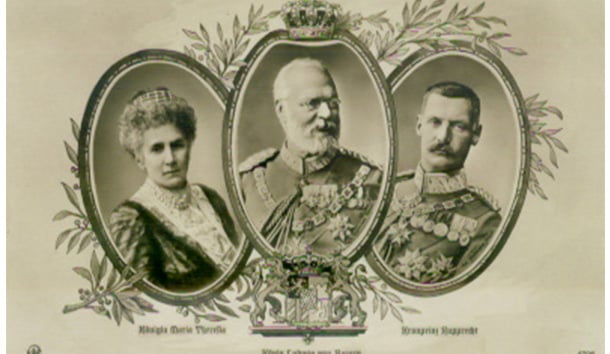When historians survey Europe’s 20th century, rarely do they question the fundamental evil of the old irrelevant monarchies and aristocratic regimes, and the obvious necessity of replacing them with progressive socialist and nationalist substitutes. A strong case can in fact be made that those ancien regime states disappeared some decades too early, and that had they survived, many evils might have been averted. Millions of squandered lives could have been saved.
The last generation of those old royal families were an impressive bunch, perceptive, resourceful, and above all, decent people. To get a sense of what might have been, look at one of those now-forgotten royals, namely Rupprecht of the ancient house of Wittelsbach, Crown Prince of Bavaria. He lived from 1869 to 1955, a span that covered multiple epochs in European history.
Far from being a fossil, obsolete in the modern world, Rupprecht emerged as one of the finest generals on either side of the First World War, and one highly open to the latest technologies. At the height of German victories in 1915, the country had to plan how to deal with its sprawling conquests. Rupprecht proposed drawing Belgium, the Netherlands, and associated regions into the German Empire, not as occupied possessions but as full federated states. That way, he thought, Bavaria and a restored Burgundy would combine to outweigh Prussia and its militarism. They would assert instead values of progress and peace, informed by Catholic social teachings. Although the idea came to nothing, it would have been immeasurably superior to any other fate that Germany experienced over the next four decades. In mid-1918, with German forces still vigorous and unbroken, Rupprecht recommended negotiating a sane, generous, and just compromise peace.
The war’s end brought an end to the Bavarian monarchy, but Rupprecht stayed far removed from far-right or nationalist plotting. He intervened to ensure the failure of Hitler’s Beer Hall Putsch in 1923, and spent the Nazi years assuring anyone who cared to listen that Hitler was insane. He hoped that the eventual failure of Hitler’s dictatorship would lead to a German monarchy restored in his own house, the Wittelsbachs. Alternatively, perhaps Bavaria could secede and (under his rule) merge with the most Catholic portions of Austria.
The Crown Prince’s social position allowed him to get away with anti-Nazi pronouncements and activities that would swiftly have brought a person of humbler social status to the gallows. Even so, in 1944, his family were imprisoned in a concentration camp, and his wife died of her sufferings. Until the time of his death, in the new West Germany, Rupprecht retained the devoted loyalty of most of Bavaria’s population, where monarchist sentiment remained very strong.
The last Habsburgs were likewise a splendid cohort who consistently worked for peace and against tyranny of all shades. The last reigning monarch of the Austro-Hungarian Empire was Karl, who in 1917 concocted a daring scheme to abandon his German allies and bring about a peace that would be just to all sides. Had Karl succeeded, he would have saved some millions of lives on the battlefronts, not to mention preempting so much ethnic strife in the postwar years. He was beatified in 2004.
The empire’s last crown prince was Otto von Habsburg, who died as recently as 2011, at the age of 99. In 1918, Otto lost his status as “Crown Prince of Austria, Hungary, Bohemia, Dalmatia, Croatia, Slavonia, Galicia, and Lodomeria,” but he tried to adjust to the new democratic world. He resisted the Nazis vigorously. When Hitler annexed Austria in 1938, Otto embarked on a harebrained and indeed suicidal plan to organize and lead the patriotic resistance personally. (The Nazis sentenced him to death.) Although he was induced to leave for the United States, he remained an inspiration for anti-Nazi activism and helped thousands of Austrians—including many Jews—to flee to the West. After 1945, he played a similar symbolic role in maintaining Austrian morale against communist occupiers.
From 1979 through 1999, Otto served as a member of the European Parliament, and he took a sympathetic interest in the affairs of countries that his ancestors had once ruled—which in practice included a majority of existing European states. When the Eastern European satellite states threw off their communist regimes in 1989, he worked to promote their welfare and prosperity.
He always claimed to be reconciled fully to European modernity, with all its manifest flaws, but some stories do raise doubts. In one interview during his final years, he stressed that he was in fact not a leftover royal but was just a regular ordinary fellow. He even liked soccer. Really, said the surprised journalist, did you watch the Austria-Hungary game last week?
Austria-Hungary? Why no, said Otto von Habsburg, in all seriousness: Who were we playing against?

Leave a Reply